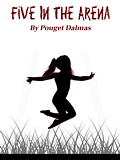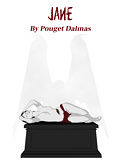Home — Ladies’ Lounge — Pouget Dalmas
Pouget Dalmas
You may want to read the Author’s Introduction below, before reading her stories.
Contact: pougetdalmas@gmail.com
Five in the Arena
Download — Text — PDF — ePub — Mobi
Jane
Cover images
Click to see full size
Stories about what?
An Author’s Introduction
Once upon a time there was a tomboy who lived in a rural little town, surrounded by nature and friends and freedom.
She went to school, did school things there, and came home again, except when it was school’s holiday of course.
She had a core group of friends, some of who she is still friends with to this day, and there were some she wasn’t so close to, and some she had sworn terrible revenge on.
She watched cartoons on the tv, films with her Mum and Dad, and though she didn’t read all that much when she was younger, she loved that her parents let her read whatever she wanted including boy’s comics if that’s what she wanted.
Right from an early age she loved Tarzan and all the copies, stories set in exotic places where danger and magic were always around the corner. So it was no surprise when she was sitting at home one afternoon in the Easter holidays, watching tv, and when she flipped the channel and found an old Tarzan film she didn’t recognise, she sat there to watch it.
That’s when her life changed.
To begin with she wasn’t really paying that much attention, but that soon changed when one of Tarzan’s friends, a muscular black tribesman in a loincloth who was sweaty or oily like they always made them in those films, discovered one of the baddies doing something she shouldn’t have been doing.
They get into a fight, and Tarzan’s friend pulls out his knife to stab the baddie.
But that’s not what happened.
As he tried to stab the baddie, the baddie grabs his hand and they struggle, rolling around on the dirt, the knife in between them.
And then it happened.
Somehow the baddie got control of the knife and pushed it slowly in the tribesman’s bellybutton, the camera lingering on the tribesman’s face as he winces and grits his teeth in pain as he is stabbed in the belly with his own knife.
Seeing he is safe, the baddie gets up and runs off, leaving the tribesman to die, lying on his back, his knife plunged into his belly all the way to the hilt, his face clearing of pain as he bleeds to death.
As she watched, she imagined everything, how it must feel to fight for your life, how it must feel to sense you are losing that fight and to know what will happen when you lose, how cruel it is to be killed with your own knife, and how incredible it must have hurt to have your knife pushed into your bellybutton.
As the scene changed, the young girl realised how strongly she had been affected by what she’d just seen. She was always a touchy, affectionate girl, always hugging her friends and kissing her family, even as she began to realise she was growing up, but as she had watched the tribesman die she held her hand to her own belly, pulling up her teeshirt and wiggling her finger in her own bellybutton as he was stabbed in his. Her heart was beating fast. She was shaking a little from the excitement. Her child’s nipples had puckered up like they did when she was cold. And between her legs, there was an odd sensation, a bit itchy but in a good way, a bit tickly, too.
I was seven years old, and though I didn’t understand it then as I understand it now, I had had an intensely erotic reaction to what I’d seen.
It changed me.
Before that film, I had played with the others in my little gang as they played.
No more.
Now, when we played Tarzan, I was always the one to die with a knife in my bellybutton. When we played Cowboys, I was the Indian squaw the cowboys killed, or sometimes I was killed by another Indian, dying with a knife or an arrow in my bellybutton. When we played Knights, I was the one run through the bellybutton with a sword or a dagger or a spear.
Sometimes I would win our fights, but usually not. Winning just wasn’t as exciting as practising my death with something sticking into my bellybutton.
As we got older, everyone else lost interest in those games, and life moved on, though not for everyone. There was something visceral and alive about a fight to the death; I loved those fantasies and I missed them.
But as I grew older I also began to worry, that they were ‘wrong’ and that you ‘shouldn’t’ get that kind of pleasure from those kinds of things, so, for a while, I tried to ignore them and not think about them, because whenever I remembered those games, that film, or other films like it, I was overcome by the same strongly erotic feelings, and the desire to play those kinds of fantasies again.
For the longest while, I got on with my life, getting a job, having relationships, and doing all the thousands of things that you do when you’re an adult, but always at the back of my mind was the memory of the games I played as a child.
I don’t remember when it was, not exactly, but on some quiet evening, probably in the winter, and maybe with a glass of whisky, I sat down at my computer and typed some words into a search engine and pressed ‘return’.
That was how I learned that I wasn’t alone, and that others did as I did, dreamt as I dreamt, and fantasised as I fantasised on those days when I was honest to myself.
So I learned how to write and composed short stories and long stories of warrior women meeting bloody ends. I learned how to use CGI programs and began to make pictures of the images in my head, again, with quite a lot of blood.
But there was a gap.
Whether it’s because of the ways we lie to ourselves about our own childhoods or whether it’s because of how we desperately cling to the idea that childhood is a period of blissful innocence, but I found that nobody was writing stories of those formative years, of children becoming youths, of pre-adolescents running around naked as they killed and were killed by their friends.
At first this was just something I found curious, then frustrating, and finally, annoying.
Without sounding too grand or pretentious or prideful about it, there was an element of childhood, mine and others, that wasn’t being spoken about.
My response is these stories.
In them I have blended all kinds of aspects of my friends at that time, merging half a dozen boys into two, and a dozen girls into two more plus myself. Names and places have been changed, and the games we played have been romanticised, but the core truth remains. Through these stories, with an adult’s eyes and a child’s memories, I want to explore that time, those people, and the games we played, and that exploration will not be limited by what is ‘proper’ or ‘right’.
In these stories you will read about children running around naked, but that is what we did and it didn’t matter a damn. As we grew older we began to respond differently to our games, deaths being a performance, not just a ‘you’re out’ until the game was done. We fought and we touched. We laughed and we got angry. We grew close and apart.
And I want to write about it all.
If you find the idea that a young boy can get an erection and that he might like that sensation, these are not stories for you.
If you think that no girl under a certain age can enjoy her nipples when she touches them, or that she can derive powerfully sensual feelings as she touches her clitoris, look away.
If you find the idea that children can respond to fighting games in the same way the audience in a wrestling or boxing match does, look away.
If, however, you are interested in a small, romanticised, and carefully fantasised snapshot of my childhood, my love of ‘fight to the death’ games, and little truths about how that all felt, then stay awhile and hear what I have to say.
Finally, whatever happened to those children who played with me during those long summers?
Nothing.
Nobody ever got more than a scratch, and what child doesn’t get those.
We grew up to be shockingly normal, a hotchpotch of farmers and their wives, housewives and librarians, and even a couple who moved to the city, only to return years later, admitting they had missed their true home all along.
These are the stories of another time, and a time that feels, now, like it belongs to another age entirely.
Who knows?
Maybe someone will read these stories and remember stories of their own. If so, I’d love to hear from you.

